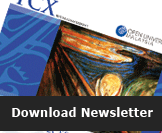Feature: Traditional Or Alternative?
Weighing Our OptionsBy Richard Ng
Assessment is an effective way of gathering critical information about the
performance of students in a course. It could measure their learning
in relation to the aims, objectives and learning outcomes stated in
a module. The assessment tools chosen must suit the knowledge and skills the students are learning.
Assessments give different types of feedback to different people. Students get feedback on their
learning while teachers get feedback on their teaching. Curriculum designers get feedback on the curriculum and administrators get feedback on the use of resources.
Employers, meanwhile, get feedback on the quality of job applicants and on the results of work-based training. Therefore, when designing and selecting assessment methods, we need to ensure that it is as meaningful,
useful and honest as possible.
Assessment could be formative or summative. Formative assessment provides feedback to students which could be used to highlight areas for further study and improvement. Summative assessment is for external
purposes and usually does not provide extensive feedback to students.
Formative assessment aims to advance teaching and learning. Summative assessment involves assigning grades to quantify a student's learning. Whether formative or summative, an assessment can be used to motivate students and lecturers.
Learning effectiveness is at the core of education but it
is difficult to measure learning in a traditional classroom and even more so in a virtual classroom.
Assessment of students' understanding could be direct or indirect. For example, assessing students' work would be indirect while asking them if they understood the contents of a course would be direct.
There are two types of assessment - traditional and alternative. Traditional assessment involves answering questions correctly. Some examples are true or false,
fill in the blanks and multiple choice questions. These
are often found in the traditional face-to-face classroom which employs teacher-centred strategies.
Alternative assessment seeks to develop higher-order thinking skills such as problem-solving, intellectual curiosity and critical analysis. It includes social learning and collaboration such as team activities, peer assessment and self evaluation. The outcomes are more difficult to measure and require a number of assessment tools.
For many, examination is still the best method of assessing a person's ability to acquire sufficient
knowledge. This traditional assessment method is universally accepted and widely used by most
universities.
In addition, it is accepted by the Malaysian Qualifications Agency and the industry as a yardstick to measure a person's aptitude.
But is this a fair assessment method when one is put under pressure to recall what was learnt and regurgitate
it within a time frame of two to three hours? What about adult learners who have poor memory but aspire to get
a degree through lifelong learning? Are there alternative assessment methods?
Of course there are but unfortunately, most of the alternative methods which have been tried over the years such as constant assessment through coursework have produced results that are just skewed as examinations. An examination tests the person as much as the knowledge,
and for that reason, despite the pain it sometimes causes,
it is probably still the best method of assessing ability available.
The advent of technology has brought about new methods to assess students' performance before, during and after a course. One example is the online open entry test conducted at OUM. This is a placement test which gauges students' ability before they are admitted into a programme.
After they become students, they are evaluated via the traditional assessment tools of mid-year and final
exams and via the alternative assessment tools of online participation and assignment.
Online participation refers to discussions in forums which may involve making connections, interpreting facts, devising arguments and responding to questions.
These require critical thinking and problem-solving skills, collaboration and real-life application.
Although alternative assessment could build up students' higher-order thinking skills, it may be
challenging for students to adapt to it. Therefore, it needs to be introduced with care and consideration in order to ensure that students could develop the pre-requisite skills and confidence.
|

